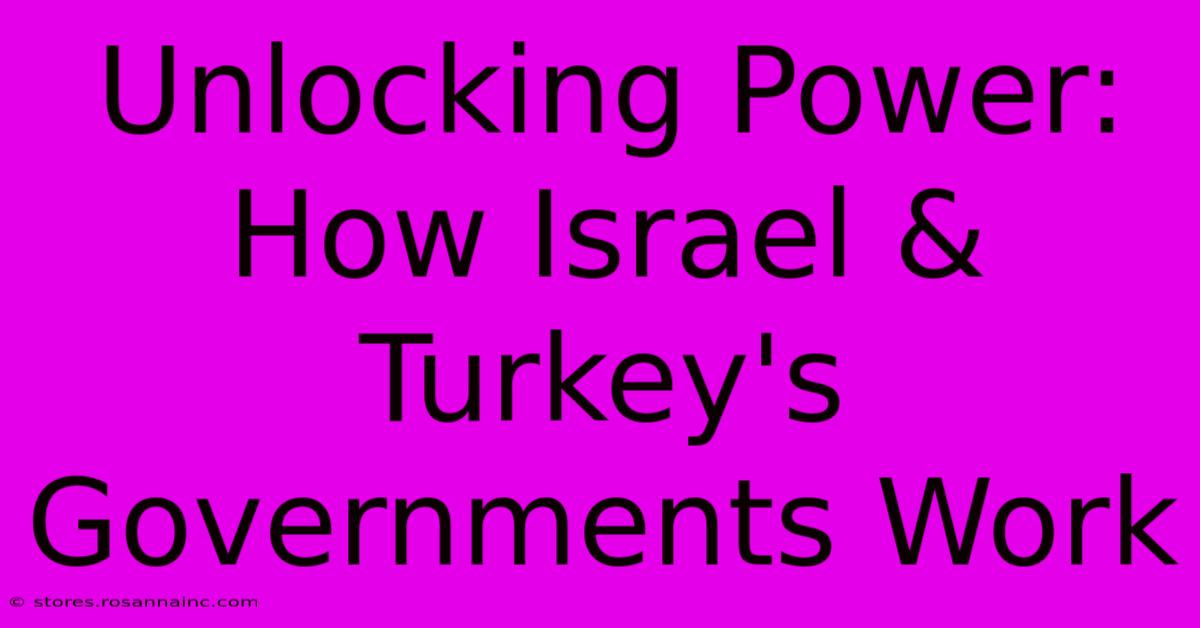Unlocking Power: How Israel & Turkey's Governments Work

Table of Contents
Unlocking Power: How Israel & Turkey's Governments Work
Israel and Turkey, two nations with significant geopolitical influence in the Middle East, boast vastly different governmental structures. Understanding their systems is key to comprehending their respective domestic and foreign policies. This article delves into the intricacies of how these governments function, highlighting their unique characteristics and underlying principles.
Israel: A Parliamentary Democracy with a Unique Twist
Israel operates as a parliamentary democracy, meaning the executive branch (the government) derives its legitimacy from the legislature (the Knesset). However, its system contains several unique elements that distinguish it from other parliamentary democracies.
The Knesset: The Heart of Israeli Politics
The Knesset, Israel's unicameral parliament, holds 120 members elected through a proportional representation system. This often leads to coalition governments, necessitating compromises and power-sharing agreements among multiple parties. The largest party usually attempts to form a coalition government, with the leader becoming Prime Minister.
The Prime Minister and the Cabinet: Executive Power
The Prime Minister, as head of government, leads the Cabinet, which is composed of ministers from the coalition parties. The Prime Minister sets the government's agenda and directs its policies, though the Cabinet as a whole must approve major decisions. The President, while largely ceremonial, plays a significant role in appointing the Prime Minister and dissolving the Knesset.
Judicial Review and the Supreme Court: Checks and Balances
Israel's Supreme Court plays a crucial role in judicial review, ensuring the government acts within the confines of the law. While not explicitly stated in a written constitution, the Supreme Court has established its authority through precedent and judicial activism. This system of checks and balances is vital in maintaining democratic principles.
Turkey: A Presidential System with Strong Executive Authority
Turkey transitioned from a parliamentary system to a presidential one in 2018, significantly altering its political landscape. This shift concentrated considerable power in the office of the President.
The President: The Center of Power
The President of Turkey is both head of state and head of government, wielding significant executive authority. Elected directly by popular vote for a five-year term, the President appoints the cabinet, sets the government’s agenda, and commands the military. This contrasts sharply with Israel's parliamentary system where power is more diffuse.
The Grand National Assembly: A Diminished Role
The Grand National Assembly (Türkiye Büyük Millet Meclisi), Turkey's unicameral parliament, retains legislative powers, but its influence is significantly diminished under the presidential system. While it can pass laws, the President's authority to veto or bypass them significantly curtails its legislative power.
The Judiciary: Ongoing Debates and Reforms
The Turkish judiciary faces ongoing debates regarding its independence and impartiality. Recent reforms have raised concerns amongst human rights organizations regarding potential limitations on judicial autonomy and the erosion of checks and balances within the system.
Comparing and Contrasting: Key Differences
| Feature | Israel | Turkey |
|---|---|---|
| System | Parliamentary Democracy | Presidential System |
| Head of Gov't | Prime Minister | President |
| Legislature | Knesset (unicameral) | Grand National Assembly (unicameral) |
| Executive Power | Shared among coalition parties | Concentrated in the President |
| Judicial Review | Strong, via Supreme Court | Subject to ongoing debates and reforms |
| Power Distribution | More diffuse | Highly centralized |
Conclusion: Understanding the Nuances
Both Israel and Turkey's governments, despite operating under different systems, play significant roles in shaping their nations and their foreign policy. Understanding the nuances of their systems – the balance of power, the role of the judiciary, and the degree of checks and balances – is crucial for comprehending their domestic politics and international relations. The contrasting models highlight the diverse ways democracies can function and the unique challenges each faces in maintaining stability and democratic principles. Further research into specific policies and events within each country is essential for a comprehensive understanding of their complex political landscapes.

Thank you for visiting our website wich cover about Unlocking Power: How Israel & Turkey's Governments Work. We hope the information provided has been useful to you. Feel free to contact us if you have any questions or need further assistance. See you next time and dont miss to bookmark.
Featured Posts
-
Doncaster Rovers Crystal Palace Fa Cup Live
Feb 11, 2025
-
Habecks Doktorarbeit Plagiatsvorwuerfe Geprueft
Feb 11, 2025
-
New Caledonian Giant Gecko Bringing The Exotic Home
Feb 11, 2025
-
The New Orleans Saints Qb A Winning Formula
Feb 11, 2025
-
Unleash The Ultimate Street Fighter Zero 3 Arcade Experience
Feb 11, 2025
